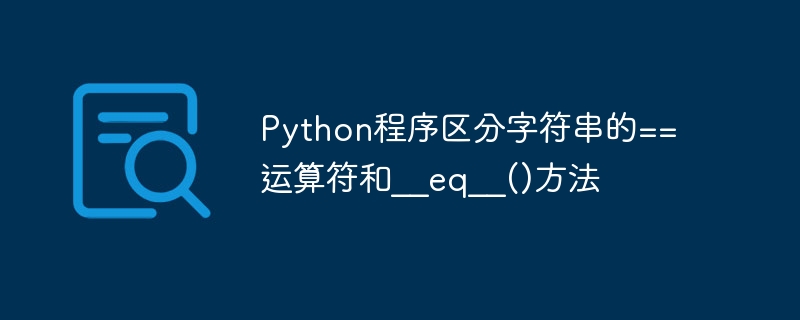

In Python, the comparison operator (==) and the equals() method are used in different ways when working with strings. To differentiate between the == operator and the equals method in Python, we have to use them with string comparisons. String comparison occurs widely when we use strings in data analysis and machine learning. In this article, we will learn how to differentiate between the == operator and the equals() method when used with strings.
== is a comparison operator used to compare two string values. Returns True when the string values are equal and False when the string values are not equal. It returns true even if the strings are stored in different memory locations. It only compares the string values for equality.
In the following example, we define two string valuesstr1andstr2and initialize them with the same string value. When we compare the stringsstr1andstr2using==operator, it returns true because the values of both strings are equal. p>
str1 = "Hello World" str2 = "Hello World" if str1 == str2: print("The strings are equal.") else: print("The strings are not equal.")
The strings are equal.
The __eq__ method in Python is used to define how to compare objects of a class for equality. The __eq__ method takes two parameters:self (the object on the left side of the == operator) and other (the object on the right side of the == operator). The __eq__method always returns a Boolean value (True or False). If it returns something other than a Boolean value, a TypeError will result.
In the following example, we create a class namedPersonwhich has two properties,nameandage. Then, we define the __eq__() method in the class to compare thenameandageproperties of thepersonobject. Finally, create two instances of the person class,p1andp2, and compare them using the==operator.
class Person: def __init__(self, name, age): self.name = name self.age = age def __eq__(self, other): if isinstance(other, Person): return self.name == other.name and self.age == other.age return False p1 = Person("John", 30) p2 = Person("John", 30) if p1 == p2: print("p1 and p2 are equal")
p1 and p2 are equal
== Operator |
__eq__method |
|---|---|
== is the default behavior in python when comparing the values of two objects. |
__eq__Methods need to be explicitly defined in the class. |
==operator can be used to compare objects of different data types. |
__eq__Methods can only compare objects of the same type |
It doesn’t have much flexibility for customization. |
__eq__Methods can be customized for specific types of comparisons. |
It cannot be inherited and should be explicitly defined for each class. |
__eq__ method can be inherited from the parent class. |
In this article, we discussed how the == operator and __eq__ method work in Python. The == operator compares strings without looking at the string's memory location. The __eq__ method is defined in the class and is used to compare two objects. The article also discusses the difference between the == operator and the __eq__ method.
The above is the detailed content of Python program distinguishes between string == operator and __eq__() method. For more information, please follow other related articles on the PHP Chinese website!




